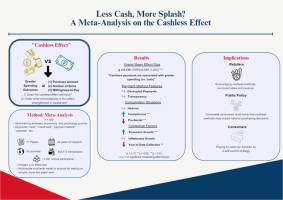Less cash, more splash? A meta-analysis on the cashless effect
Journal article
Schomburgk, Lachlan, Belli, Alex and Hoffmann, Arvid O. I.. (2024). Less cash, more splash? A meta-analysis on the cashless effect. Journal of Retailing. 100(3), pp. 382-403. https://doi.org/10.1016/j.jretai.2024.05.003
| Authors | Schomburgk, Lachlan, Belli, Alex and Hoffmann, Arvid O. I. |
|---|---|
| Abstract | Over 40 years of research links cashless payment methods to increased consumer spending. Referred to as the “cashless effect,” this phenomenon has recently come under scrutiny as consumers are increasingly familiar with non-cash methods which could weaken the cashless effect, while other research challenges the robustness of the effect and questions which conditions could strengthen or weaken it. The current study contributes to reaching a consensus in this ongoing debate through a large-scale meta-analysis leveraging a meta-analytical framework that synthesizes the insights from the extant literature. Across 392 effect sizes from 71 papers, we reveal a small, but significant, cashless effect. Further, we show no evidence that cashless payment method features influence the cashless effect, while various consumption situations and contextual factors do. Specifically, the cashless effect is stronger in conspicuous consumption situations, while it is weaker in pro-social consumption situations. The results also reveal that the business cycle impacts the cashless effect, with it being stronger in periods of economic growth. Finally, the cashless effect has generally weakened over time. Our findings offer novel and actionable insights for academics, consumers, and practitioners such as retailers, charities, and policymakers interested in the effects of payment methods on consumer spending behavior. |
| Keywords | cashless effect; cashless society; payment methods; consumer spending behavior; meta-analysis |
| Year | 2024 |
| Journal | Journal of Retailing |
| Journal citation | 100 (3), pp. 382-403 |
| Publisher | Elsevier Inc. |
| ISSN | 1873-3271 |
| 0022-4359 | |
| Digital Object Identifier (DOI) | https://doi.org/10.1016/j.jretai.2024.05.003 |
| Scopus EID | 2-s2.0-85194562686 |
| Open access | Published as ‘gold’ (paid) open access |
| Publisher's version | License File Access Level Open |
| Output status | Published |
| Publication dates | |
| Online | 10 Sep 2024 |
| Publication process dates | |
| Accepted | 29 May 2024 |
| Deposited | 09 Feb 2025 |
| Additional information | © 2024 The Author(s). Published by Elsevier Inc. on behalf of New York University. This is an open access article under the CC BY license (http://creativecommons.org/licenses/by/4.0/). |
https://acuresearchbank.acu.edu.au/item/91526/less-cash-more-splash-a-meta-analysis-on-the-cashless-effect
Download files
Publisher's version
| OA_Schomburgk_2024_Less_cash_more_splash_A_meta.pdf | |
| OA_Schomburgk_2024_Less_cash_more_splash_A_meta_[GRAPHICAL_ABSTRACT].jpg | |
| License: CC BY 4.0 | |
| File access level: Open | |
76
total views78
total downloads3
views this month9
downloads this month
